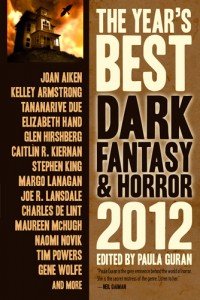 An Interview by Jennifer Konieczny
An Interview by Jennifer Konieczny
“After-Words” by Glen Hirshberg will be appearing in Prime’s forthcoming Year’s Best Dark Fantasy & Horror: 2012 edited by Paula Guran. Pre-order here!
“After-Words” is the second of your Book Depository stories. Can you tell us how it relates to the first story, “Esmerelda,” and what inspired it?
The book depository stories are still an evolving universe. I have thoughts about how they’ll eventually tie together, should I get more of them down, but mostly, I just want to keep exploring not just what it will mean for the world when books vanish, but what the legacy of books will be. I also want to be careful not just to romanticize the book as object (much as I adore books as objects). Part of the reason I think we love them so much is that they really are potentially dangerous, even lethal things. And that, I think, was the central inspiration for “After-words.”
Erick Kinney’s father should have burned or buried the copy of Kipling that the library sent him. Instead he kept it and it passed down to his son. What books would you defy quarantine rules to save?
Hah! I love that question. Hmmm.
I’m tempted just to list favorites: Kipling, Stevenson, Wodehouse, Austen, Charlotte Bronte, M.R. James, Machen. Or lost favorites (Stella Benson’s Living Alone, or Elinor Wylie’s poems). But the truth is, I think all of those works will survive, because there are people who passionately love them. So what I’d say instead is this:
There are no books I’d defy quarantine to keep, because I want people (including myself) alive to read the stories, and in the end, it really is more about the words than the medium, for me. But I’d defy laws (as opposed to quarantine) to keep hold of the specific editions (many just ratty paperbacks) that have kept me company, that have accrued resonance from the thousands of days I’ve been lucky enough to share with them.
Aaron says neither Ariel or his father could “understand about why saving books from extinction might be worth fighting for.” How do you feel about publishing moving towards e-books and away from traditional books? Do you use an e-reader?
I do use e-readers, and to my surprise, I love them. But I love them primarily because they give me opportunities to read even more, and to access difficult-to-find material. I think it remains to be seen whether the move to e-books will wind up good for writers, for readers, etc. I love books, and will always have them in my home and life, but I don’t feel it my duty or mission to proselytize for them. I’d rather proselytize for great writing. There’s an opportunity here to loosen the stranglehold that a staid, snarky, smug few have exerted over what constitutes good writing and who will have access to it for too long. I don’t have any particular faith that will happen. But we can all dream…